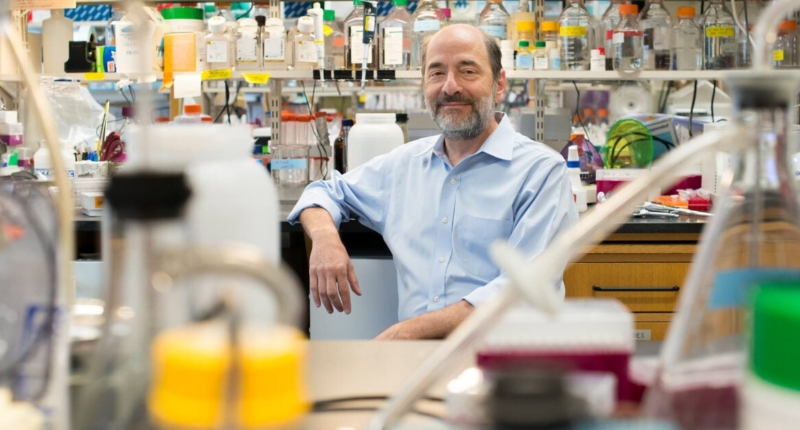Harvard neurobiologist Michael Greenberg is one of three neuroscientists awarded The Brain Prize 2023 for their contributions to understanding brain plasticity. The prize, considered the world’s most significant award for brain research, recognizes researchers who have made highly original and influential discoveries in brain research. Greenberg’s work focuses on understanding how the brain modulates gene activity to support brain plasticity. His research has led to significant advances in understanding the cellular and molecular mechanisms behind brain plasticity, a hallmark of the brain that underlies its ability to function over many decades and recover from damage. Additionally, his discoveries have provided researchers with tools to identify the neurons and neural circuits that mediate behavior and new strategies for making detailed observations about the molecules and mechanisms that mediate learning, memory, and behavior. Greenberg’s research has led to important technical advances and yielded new possible mechanisms for long-lasting brain plasticity that may underlie associative learning and spatial navigation.
Harvard Neurobiologist Wins The Brain Prize 2023 for Brain Plasticity Research
Michael Greenberg, a neurobiologist at Harvard Medical School, is among the three neuroscientists who won The Brain Prize 2023. The Brain Prize is considered the most prestigious award for brain research globally and is given to researchers who have made highly original and influential discoveries in brain research.
Greenberg shares the award with Christine Holt, a professor of developmental neuroscience at the University of Cambridge, and Erin Schuman, the director of the Max Planck Institute for Brain Research. The three scientists have made significant strides in uncovering the cellular and molecular mechanisms that enable the brain to restructure itself in response to external stimuli, adapt, learn, and even recover from injury.
The prize, awarded annually by the Danish Lundbeck Foundation, includes approximately €1.3 million to be shared by the three recipients. Greenberg’s research focuses on understanding how the brain responds to signals from the outside world to modulate the activity of genes that make proteins essential for brain plasticity.
Throughout his career, Greenberg has elucidated the identities, roles, and relationships of the various genes, proteins, and molecules involved in this process. He has delved into the details of how the brain creates new neural circuits and modifies existing ones, which is a hallmark of the brain’s ability to function over many decades and recover or regain function after damage.
David Ginty, chair of neurobiology at HMS, said, “That our sensory experiences shape the structure and function of the brain is one of the profound discoveries in the field of neuroscience in the 20th century. Mike’s work, which has extended into the 21st century, has explained how this fundamental feature of brain function is achieved at a molecular, cellular, and circuit level.”
Brain plasticity is the brain’s ability to rewire itself in response to new information throughout life. This highly complex and dynamic process requires the brain to carefully orchestrate a multitude of molecules that communicate in signaling pathways and form the cellular basis of learning and memory.
Harvard Neurobiologist Wins The Brain Prize 2023 for Brain Plasticity Research
Michael Greenberg, a neurobiologist at Harvard Medical School, along with two other neuroscientists, has won The Brain Prize 2023 for their exceptional work in brain research. The Brain Prize is considered the most significant prize globally and is awarded to researchers who have made highly original and influential discoveries in brain research.
Understanding the Role of Genes in Brain Plasticity
Greenberg has spent his career exploring the role of genes in brain plasticity, the brain’s ability to change and adapt over time. He has studied how genes work together with life experiences and external signals to support brain development and ensure that the brain remains adaptable over time. Greenberg’s research focuses on how the brain responds to signals from the outside world to modulate the activity of genes that make proteins essential for brain plasticity.
Holt and Schuman’s Contributions to Brain Plasticity Research
Greenberg shares the award with Christine Holt, a professor of developmental neuroscience at the University of Cambridge, and Erin Schuman, the director of the Max Planck Institute for Brain Research. Holt’s research focuses on the vertebrate visual system to understand how neural connections in the brain form and are maintained over time. She has shown that proteins must be made and degraded locally to guide the growth of cone cells needed for vision. Holt’s work sheds light on how neural connections are established and how axons are sustained throughout life.
Schuman is interested in the processes that control how proteins are made and degraded in neuron structures that are distant from the cell body. She has established that proteins made in dendrites are needed for synaptic plasticity and revealed molecular details of the mRNA and ribosomes involved. Schuman’s lab has developed new tools to label, purify, identify, and visualize newly made proteins in neurons and other cells.
Groundbreaking Discoveries on Synthesis of New Proteins
The Brain Prize 2023 winners have made groundbreaking discoveries by showing how the synthesis of new proteins is triggered in different neuronal compartments, guiding brain development and plasticity in ways that impact our behavior for a lifetime. The discoveries of Greenberg and co-recipients Holt and Schuman have provided insights into the cellular and molecular mechanisms that enable the brain to restructure itself in response to external stimuli as it adapts, learns, and even recovers from injury.
The Power of Basic Discovery in Scientific Progress
HMS Dean George Q. Daley said, “Mike’s elegant research highlights the power of basic discovery as the most essential fuel for scientific progress. His impressive accomplishments, which now include this wonderful accolade, show just how much is possible when researchers unwaveringly follow their curiosity and scientific passions.”
The Brain Prize 2023 includes approximately €1.3 million to be shared by the three recipients. The prize is awarded annually by the Danish Lundbeck Foundation to researchers who have made highly original and influential discoveries in brain research.
Harvard Neurobiologist Michael Greenberg’s Research on Gene Expression Changes in Brain Function
Harvard neurobiologist Michael Greenberg has dedicated his career to studying the mechanisms by which the brain adapts and learns over time. Greenberg’s research has centered on the role of genes in this process and how they work together with life experiences and external signals to support brain development and ensure that the brain remains adaptable over time.
A Paradigm Shift in Neuroscience
Greenberg established a connection between neurotransmitters and changes in the activity of genes, identifying a signaling cascade that leads to changes in gene expression. He further defined the signaling pathways that neurotransmitters use to activate genes and identified specific proteins involved, including the protein CREB, an important mediator of long-term memory. His findings offer insight into the mechanisms by which activity-related genes control the maturation, pruning, and stability of synapses.
Possible Mechanism for Brain Plasticity
Greenberg’s work sheds light on the origins of disorders in which mechanisms of neural plasticity are disrupted. He is now working to further characterize the products of genes controlled by neural activity, including how these gene products interact. His findings offer a new possible mechanism for long-lasting brain plasticity that may underlie associative learning and spatial navigation.
Role of Fos in Remodeling Genetic Material
Greenberg has linked Fos to remodeling genetic material inside cells in conjunction with a protein complex called BAF, which has been implicated in neurodevelopmental disorders such as autism. He has also established that Fos plays a role in context-dependent memories and the plasticity of the visual system during development.
A Remarkable Career
Greenberg’s research efforts have provided valuable insight into the cellular and molecular mechanisms that enable the brain to restructure itself in response to external stimuli. His work has earned him a well-deserved reputation as a leading neurobiologist in the field of brain plasticity.
Greenberg’s Impactful Research
Neurobiologist Michael Greenberg, the Nathan Marsh Pusey Professor of Neurobiology in the Blavatnik Institute at Harvard Medical School (HMS), is a recipient of The Brain Prize 2023. Along with two other neuroscientists, Christine Holt and Erin Schuman, Greenberg has been recognized for his significant contributions to brain plasticity.
Significant Contributions to Brain Plasticity
Greenberg’s research has been focused on understanding how the brain responds to external stimuli to modulate the activity of genes essential for brain plasticity. Greenberg has also established a connection between neurotransmitters and changes in the activity of genes, and he has identified the specific proteins involved in these processes.
Technical Advances in Neuroscience
Greenberg’s research has led to important technical advances in neuroscience. His discoveries have provided researchers with tools widely used to identify the neurons and neural circuits that mediate behavior. Greenberg’s work has also led to innovative ways of trapping neurons to assess their function in neural circuits and new strategies for observing the molecules and mechanisms involved in learning, memory, and behavior.
Awards and Honors
In addition to the Brain Prize, Greenberg has received numerous other awards for his contributions to neuroscience, including the 2015 Gruber Prize in Neuroscience, the 2019 Ralph W. Gerard Prize in Neuroscience, and the 2022 Edward M. Scolnick Prize in Neuroscience. He is also a member of the American Academy of Arts and Sciences, the National Academy of Sciences, and the National Academy of Medicine.
The Brain Prize, which is considered the world’s most significant prize for brain research, is awarded annually by the Danish Lundbeck Foundation to researchers who have made highly original and influential discoveries in brain research. Winners are selected by a committee of leading neuroscientists from around the world with expertise in diverse neuroscience disciplines.
Don’t miss interesting posts on Famousbio










